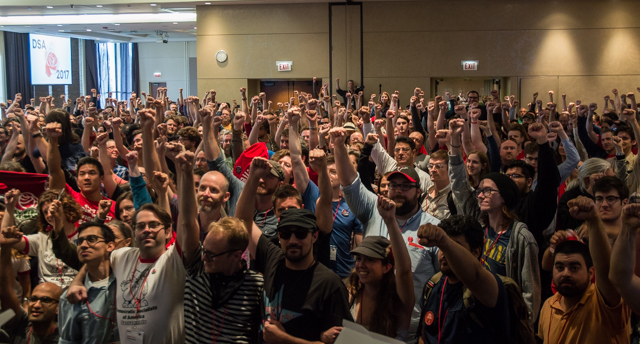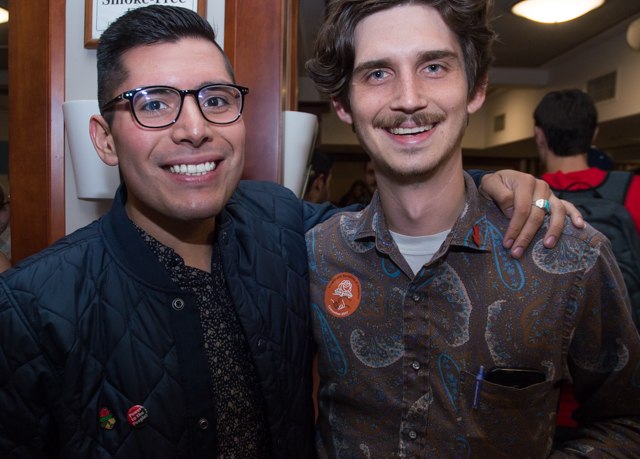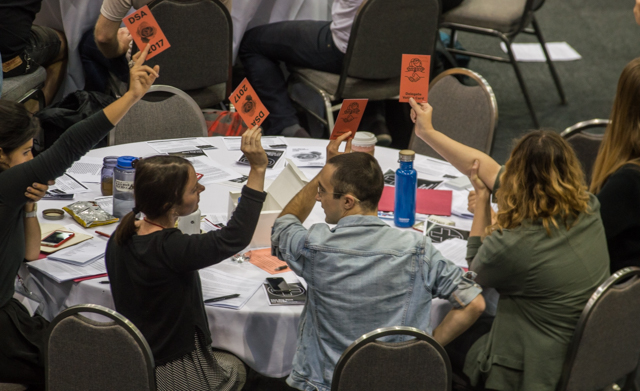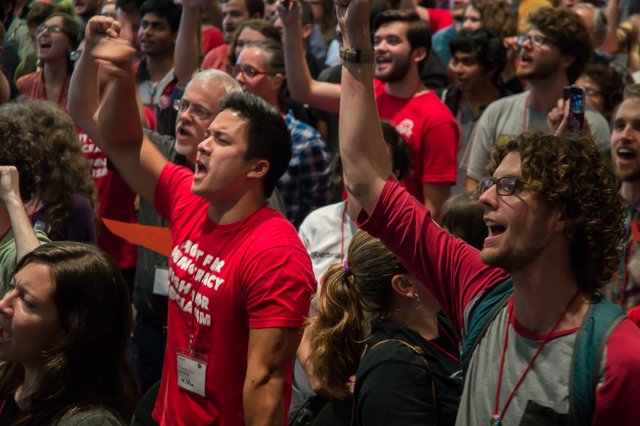Chicago Just Hosted The Largest Democratic Socialists Convention In Years
By aaroncynic in News on Aug 7, 2017 7:41PM

Members of the Democratic Socialists of America pose for a group photo at their biannual convention in Chicago at UIC. Photo by Aaron Cynic.
Nearly a thousand members of the Democratic Socialists of America descended on the campus of the University of Illinois Chicago over the weekend for their largest convention in recent history.
As mainstream politics and discourse in the United States have seemingly continued their further push towards the right, symbolized best with the election of Donald Trump and the now president’s penchant for embracing open fascists, it might be difficult for some to see how a leftist movement could cohere, particularly when mainstream Democrats seem to be scrambling to resist the administration.
The DSA’s explosive growth over the past few months—membership jumped from around 8,000 to 25,000 since November—shows however that though it still may be small and working out how to best organize, another leftward alternative to the right wing mainstream is growing.
While not a traditional political party (the DSA operates as a “big tent” organization) the DSA has become the largest socialist organization since World War II. Members pay dues, but chapters operate autonomously, with some steering from a constitution and bylaws along with a National Political Committee that helps implement the organization’s broader political and organization goals. Currently the DSA claims 177 local groups in 49 states and Washington, D.C and at least 17 local elected officials, including two in Illinois, Chicago alderman Carlos Rosa and Dylan Park, an alderman in Rock Island.

Chicago Alderman Carlos Ramirez-Rosa and Alderman Dylan Park of Rock Island, Illinois. Photo by Aaron Cynic.
Part of the organization’s membership spike can be attributed to Vermont Senator and former Democratic Presidential candidate Bernie Sanders, who ran as an open Democratic Socialist, along with growing movements across the country to fight the agenda of President Donald Trump.
“There are a lot of people who have been dissatisfied with the direction of the country and are feeling very powerless, then they saw Bernie and he spoke to people,” said Maria Svart, National Director of the DSA. “He had millions of votes as an open democratic socialist and then Trump won the electoral college. Members now really felt that they needed to respond, organize, to defend their communities so they started coming to DSA because they felt that democratic socialism as an ideology confronting capitalism is very important and they wanted to be in an organization that is effective and that’s why we’re growing so much and why it feels like such a historic moment - because this hasn’t happened in recent years. There’s been a lot of malaise in the progressive movement and people are ready to fight back.”
The starkest difference, outside of numbers, between the DSA convention and the mainstream Democratic and Republican national conventions is a complete lack of pomp, circumstance, pageantry, and an endless parade of speeches. In their place lay a host of resolutions, votes on whether or not to vote on amendments, and other lengthy procedural debates. Democracy is messy, and so it’s to be expected that Democratic Socialism would be messy too.

Members of the Democratic Socialists of America hold up cards to signal their votes on a proposed resolution during their biannual convention in Chicago. Photo by Aaron Cynic.
“I think the logistical challenges of having 1,000 people when our last convention had 125 people frankly is going to be a big thing,” Svart said before it began. “We are a big tent organization so there are people that have different perspectives on how we should proceed, but I think that there won’t be any major issues because we’re all united and we’ve come together in this really historic convention. We all know that Donald Trump is a problem and also Wall Street Democrats are a problem.”
Out of four days of discussion and deliberation, the DSA managed to adopt several broad sweeping goals which serve as guides for how it will proceed over the next two years. Among them include a call for free universal health care, increased support for labor movements, unions, and the fight for a $15 an hour minimum wage, joining the boycott, divestment, and sanctions (BDS) movement in solidarity with Palestinian people, and a general commitment to taking on Wall Street backed politicians.
“Democratic socialists aren’t afraid to challenge the status quo and demand what’s right,” Rawan Tayoon, a member of the Young Democratic Socialists, the DSA’s group for members under 31, said in a statement. “We stand against imperialism, we stand against racism, and so we must stand against Israeli apartheid and occupation.”
“We need a concrete political campaign that people can plug into immediately,” Ari Marcantonio, an organizer with the East Bay DSA told members in a speech closing out the convention. “A door they can knock on, a conversation they can have with their neighbor about the shared fight for medicare for all and how we as working people are going to fight together to liberate ourselves from the private insurance industry oligarchy.”

Members of the Democratic Socialists of America sing The Internationale, a socialist anthem. Photo by Aaron Cynic.
While over the years socialism has become something of an umbrella four-letter buzzword pitched out by the right to criticize any policy that doesn’t fall in line with its agenda, some DSA member’s goals include organizing on a more grassroots local level anywhere their message can find sympathetic ears.
“I’m very much opposed to the butt kick in the doors saying ‘I’m here for the socialist revolution,’” said Dylan Parker, a DSA member who was elected as an alderman in Rock Island, Illinois in April. “We have to meet rank and file Americans where we’re at. We can’t expect them just to know Marxist theory because most Americans don’t...They’re working full time jobs just trying to get by and then just trying to catch the next episode of Game of Thrones or something. We have to meet them where they’re at and be respectful of that so we don’t alienate people.”
Parker, whose job as alderman is part time, works 40 hours a week in a diesel shop and has three children, said one of the issues he campaigned on was bringing public internet infrastructure to an area where privatized ISP’s aren’t yet delivering the service people want. That he said, was an example of how to present some of the DSA’s core ideas while tamping down some of the negative stereotypes that have been created around the word ‘socialism.’
He said that his constituents can “see the real world application of our values—public ownership, shared ownership, solidarity, or whatever you want to call it, and you don’t have to call it Socialism. They see the value in it and you spread that." When his constituents hear about him going to the convention, Parker said that's a way for them to connect the dots on how capitalism's failings affect own community. "The reason this isn’t working is because the capitalist system is not allowing my community to benefit from high speed internet or something like that. It’s very nuanced, it’s very slow, it’s very not in your face, but that’s the way we have to do it if we want to have genuine relationships with working Americans.”